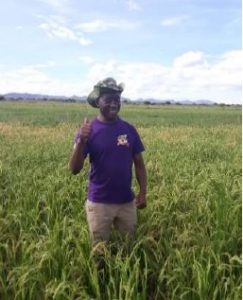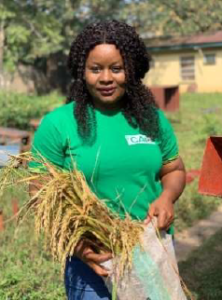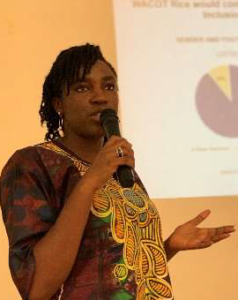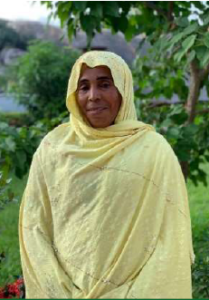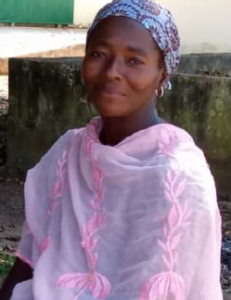Business-driven women working in rice value chains in Burkina Faso, Ghana, Nigeria and Tanzania
Context. Rice is one of the key staple foods in Africa. The demand is rapidly increasing: the population
is growing, people are moving to urban areas and consumer behavior is changing. Local rice producers
are not able to tap into this opportunity as 90% of all locally cultivated rice is produced on small fields,
with an acreage of less than one hectare. Average yields in Sub-Saharan Africa are amongst the lowest
in the world. There is limited knowledge of modern and sustainable farming techniques, high-quality
seeds, fertilizers and crop protection practices as well as a lack of the necessary infrastructure for efficient
storage, transport and processing.
Competitive African Rice Initiative. CARI works with the national rice industry to support smallholder
rice farmers to increase their incomes and to supply their families and communities with high quality
rice in Burkina Faso, Ghana, Nigeria and Tanzania. Girls and women in the intervention areas are subject
to unequal opportunities across all spheres of personal and economic life. They have limited access to
land, inputs and information. They also face the double burden of house chores/children and having to
make a living. They are often subject to child or forced marriages, female genital mutilation and so on. Discrimination
is mostly the consequence of traditional, cultural or religious practices. The situation of women
is worsened by partly discriminatory statutory laws.
Even if statutory law treats men and women equally, it is not sufficiently enforced due to limited government
presence in remote rural areas. High poverty incidence creates substantial economic pressure on
smallholders, putting girls directly at the disadvantage with regards to their education and training. As a result,
women’s ability to engage in commercial agricultural production and processing is being limited.
In a nutshell: Roles of women and men in rice smallholdings
Men dominate rice production and usually
are the sole owner of the land they farm.
Only a small share of rice producers is female.
They predominantly engage in subsistence
farming.
Women dominate post-harvest activities
(such as threshing, cleaning, winnowing)
and small to medium scale processing (such
as parboiling).
In cases where women support their husbands
during production, men usually take
over activities demanding a certain level of
physical strength, such as land preparation
as well as the application of phytosanitary
products. Women usually engage in (trans-)
planting, weeding, bird scaring, and harvesting.
Women with young children are confronted
with the decision of whether to farm and expose
their children to the sun and other risk
factors in the field, or to stay at home.
Our strategy. CARI has been designed as a regional program. Applying standardized approaches
cost-effectively and at large scale is one of our unique selling points. Jointly with our Matching Fund
(MF) partners, which are local public or private institutions, mostly small to medium sized rice processors
or input providers, we design numerous activities along the value chain. The MF partners contribute
at least 70 % of the budget and implement the activities. CARI’s requirement is that at least 30% of the
beneficiaries are female. Whilst our approach is highly effective to create impact in the rice sector at a
large scale, there are – let’s face it – limits to gender sensitive programming of operations. This is caused
by the diverse geographic, religious and ethnic contexts CARI works in. Equally, we need to assume that
most of the partner staff was brought up and lives within this discriminatory system. In fact, a superficial
gender-related measure may even increase the vulnerability of women rather than empowering them.
To promote gender inclusive value chain development, we have intensified our collaboration with selected
partners, who have shown the capacity and passion for gender equality and women’s empowerment.
More women – more income: Experience from Tanzania.
In Tanzania, the rice miller Musoma Food has
been our MF partner since 2016. Mr. Stephano Mpangala,
Project Coordinator, shares his experiences with us:
Musoma has been collaborating with CARI since 2016. Currently
you implement the second MF project.
What is your strategy to empower female rice farmers?
“For us as rice miller having high quality and sufficient quantities of
paddy is key. For this reason, during the first phase of the project we
focused on technical aspects of rice production. CARI has really motivated
us to go the extra mile and to push for the participation of
female rice farmers in our operations. It was not always easy, but I
can proudly say that we are at 36% female outreach. We can see
that we are getting more and better paddy, and that the households
we work with have become stronger.”
Where did you meet challenges?
“Well, the women produced more rice, but mostly the male household heads remained in charge of marketing the
rice and managing the income. For this reason, in the new project we put the emphasis on sparking the business
spirit in our male and female farmers via FBS2 so that they become business-driven. Like this, not only do the women
start “owning” their rice more and become more self-confident, but also their husbands see the economic benefits
of having two strong rice producers in the house.”
What do you recommend CARI to improve gender equality in the rice value chain?
“Firstly, to strengthen women groups, we advice women should be grouped in 10 to
15 members at a go. This is smaller than the usual groups used for trainings or to
build cooperatives. But it allows women to effectively participate in activities as they
cannot work far from their homes. Secondly, we have learnt that despite the risk of
men feeling offended by empowered women, this is really not the case in our operational
area. If the husbands understand the wife’s contribution to the household income,
he is fine. We recommend that women and men should jointly attend trainings.
Like this, they both profit and the husband feels comfortable.”
What’s next for Musoma Food?
“We hope to establish a program with CARI where alternative sources of income for
women such as groundnut, sunflower and sweet potato production or processing are
developed. Like this, even a higher number of women than our current 2,976 women can be reached and the risk
from strong dependency on rice production is reduced.”
Voices from strong women in Nigeria.
“Balanced nutrition is the basis for a prosper future. In Northern Nigeria, women continue
to be segregated and stay mostly indoors. They hardly engage in commercial
activities. Due to uneducated parents and prevailing poverty, many children are deprived
from education, balanced nutrition and emotional stability, which are the
foundation of a happy and fulfilling life. If we don’t work hard on gender equality, we
lose the next generation, boys and girls. Empowering women means getting both the
buy-in of men as well as courageous skillful women. We sensitize our men in our sessions
and enable them via FBS to understand the benefits of a working wife: The additional
income can be used for education and balanced household nutrition. Concurrently,
we give our women skills at hand to start commercial activities.”
Stella Longpoe, Value
Chain Advisor CARI
“To engage the women in northern Nigeria we use a different approach: We initially
approach them directly with our female staff to make them feel comfortable.
Rice production is technically demanding, so it is important that we do not
assume the same knowledge level for men and women. We therefore adjust our
extension approach for the women and fill the gaps with targeted tools. I recommend
CARI to keep insisting on the 30% female participation rate in training. This
has contributed to our commitment in involving more women despite cultural
challenges experienced here in the rice producing areas. We can now see the impact:
More and more women are economically active, and seeing them succeed
encourages other women to follow. I also encourage women in employment to
work hard to climb up the career ladder. Be unique in your choices of mentors
and your delivery at the work place. Know your worth and present your
knowledge with confidence”.
Osenaga Umobuarie, Head
of Sustainability, WACOT
“I have started working as FBS, CBS1 and RiceAdvice trainer for the CARI MF in Jigawa
State with Green Sahel in 2015. I invest lots of time in building up a trustful relationship
with the women groups. These groups do well because they are determined and
because we train them. I recommend all women to seize their opportunities, grasp
knowledge where they can and stand on their own feet. With the money I have
earned as extension agent, I have bought 1 ha of land and rented another one. This
raining season I have produced 88 bags of rice seed (about 6,600 kg). From the sales
I get additional revenue of 1.3 million Naira. I also grow water melon. In the meantime,
I have become so competent that I have started working for other organizations,
too, meaning more money. All my 9 children are attending school, my oldest
son just finished his master and his siblings are following.”
Hafsah Dan Abba,
Extension agent & rice
farmer, Green Sahel
Empowering women through parboiling in Burkina Faso. In 2015, CARI entered into a
MF partnership with Union Nationale des Etuveuses de Riz du Burkina Faso (UNERIZ), the national
union of rice parboiling women. During the last five years, the partnership has been a tremendous success:
1,303 women have been trained in parboiling, 1,063 in diversification and 832 in FBS.
Parboiling of rice requires high quality and quantity paddy, just like regular rice mills. The parboiling
women can only generate sufficient profit if the paddy is of good quality and if they apply improved
parboiling techniques. Taking the previously built technical capacity of rice producers and parboiling
women as foundation, UNERIZ focuses on:
Improving the link between producers and parboilers. Before the CARI intervention, the relationship
between farmers and parboilers was characterized by a high degree of mistrust. Nowadays,
farmers even reserve their produced rice for the parboiling women
Strengthening the parboiling societies and members to become functional business-oriented
entities via cooperative strengthening training, FBS and sensitization on contract farming
Bolstering the collective and individual voice of parboiling women at all levels: (1) at household
level to get enough time for their economic activities, (2) at commercial level to bargain good
prices and (3) at political level to lobby for their business needs
Sensitizing paddy producers about the economic and nutritional value of parboiled rice
“Before the CARI intervention with UNERIZ started, I worked rather informal with
my own parboiling methods which were risky. I had no economic power in my family
and only produced for self-consumption. Through CARI, I was taught about the
improved parboiling technologies and credit management. I even received financial
education. Now I myself give trainings. I realized that I am much better organized
and able to assess the profitability of my parboiling business. My rice is of
better quality and I was able to increase the production quantity of parboiled rice
and improve my turnover. Since the intervention, I am in a much better economic
situation and can even contribute to my children’s education and health care costs.
Furthermore, I now have a better standing in my family. Together with my group,
I deliver rice to shops and we even serve school canteens.”
Natogoma Traore, parboiler,
UNERIZ
Closing the gender gap – our action plan for 2020. With 18 remaining months of project
implementation, we will channel our resources into selected economically viable approaches to further
strengthen women in the rice value chain. Due to the discriminatory environment in which we operate,
we will emphasize the economic value of strong women.
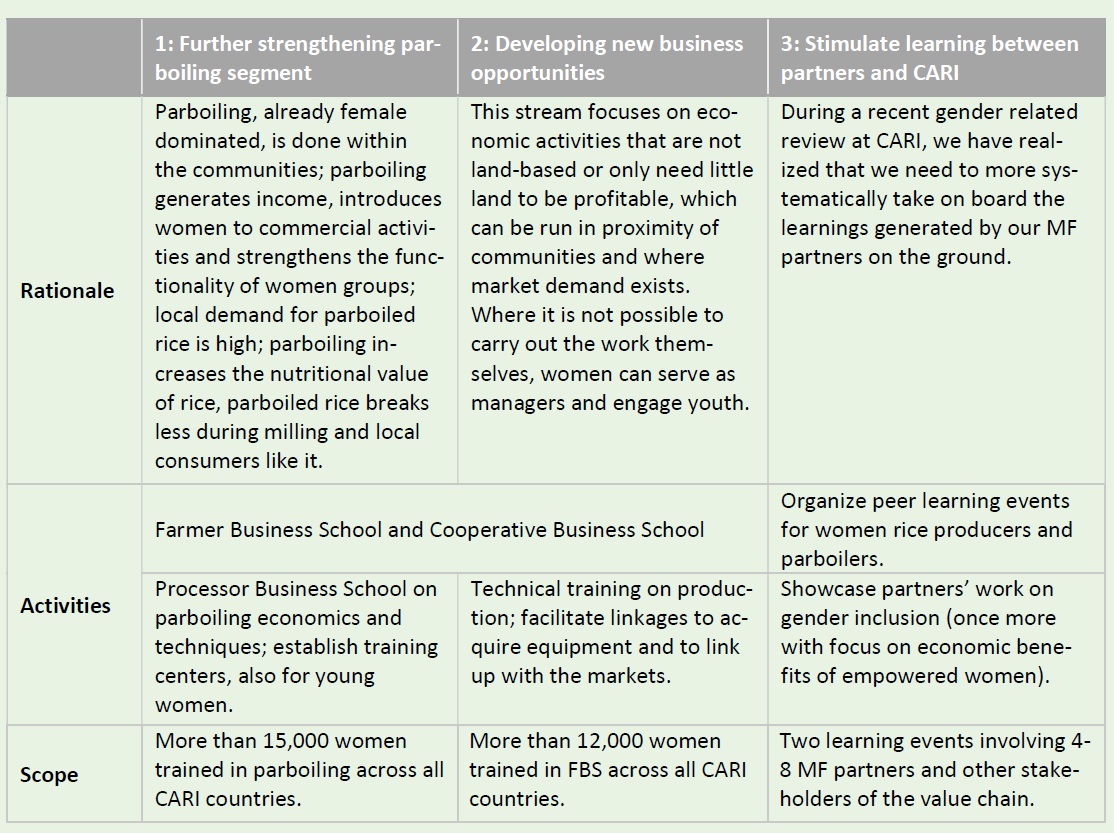

 GIZ Gender Website
GIZ Gender Website